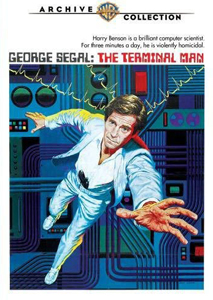I wonder if “The Terminal Man,” the 1974 adaptation of Michael Cricthon’s 1972 novel, was influenced in its production design and marketing by popular SF films of the time. In close-up shots, the brain surgery team’s facemasks resemble “2001” space suits or “Andromeda Strain” hazmat suits.
Slow Seventies SF
“The Terminal Man” no doubt hoped for that level of attention, but it ended up more of a curiosity among Crichton adaptations and 1970s SF. It’s too slow-paced to appeal to a kid with a budding SF interest. But adults might be engaged, especially if they’re on a Crichton kick.
The film essentially has two halves. The first half is like the Mr. DNA part of “Jurassic Park,” but stretched out. It’s like a public school filmstrip, except that it’s about brain surgery for the purpose of implanting electrodes, which can then be used for mind control. Specifically, in the case of Harry Benson (George Segal), electric bursts will go off when he has a seizure, thus halting the seizure.

“The Terminal Man” (1974)
Director: Mike Hodges
Writers: Mike Hodges (screenplay), Michael Crichton (novel)
Stars: George Segal, Joan Hackett, Richard Dysart
As with the Mr. DNA segment, the immersive science in “Terminal Man” is a fake-out. It’s so clinical, methodical and procedural that a credulous viewer will take it as a complete, thorough statement. But there are logic holes. How do they know where to put the electrodes? How do they know shocks will stop the seizures? (Similarly, in “JP,” how do they know what the “missing” DNA strands are, without a complete strand to compare it to?)
These skimmed-over issues also point to why “Terminal Man” is still SF today, rather than an accurate prediction of the future (as is the case with “Andromeda”). We don’t know much more about the human brain than we did in the mid-’70s – which is to say almost nothing.
Cold and clinical
That’s not a storytelling flaw, though, because Crichton – channeled through screenwriter-director Mike Hodges – is tapping into his favorite theme: the unpredictability of complex systems. In this first brain experiment on a human being, it turns out that, yes, the shocks do stop Benson’s seizures. But they also cause the brain to create more seizures, at shorter intervals. In a nutshell, if Benson was already crazy, now he’s really crazy.
In addition to the “space” suits, “Terminal Man” shares “2001’s” and “Andromeda’s” traits of being cold and flat. Segal gives a soothing performance despite (or because of) the fatalism of Benson’s situation; his voice sounds like the HAL-9000’s. When the seizures kick in, his face does a Gumby contortion, but not to the point of unintentional comedy.
In an awkward attempt at deeper characterization, we’re told Benson is paranoid about machines taking over our lives, but that point is not necessary. Even someone who was gung-ho about experimental tech would be nervous about this procedure.

Joan Hackett, who died a decade later at a young age, is also compelling in an understated way as Dr. Janet Ross. As in the book, Ross organically but surprisingly emerges as the main character, and we end up liking her. Among this team that’s gung-ho about the experiment, Ross is the most cautious.
A sparse city
Hackett, Segal and some unconventional-looking actors (check out the aggressive questioner in Benson’s lecture-hall interview who resembles “Star Trek’s” Armin Shimerman) keep us interested. But the cold vibe dominates as cinematographer Richard H. Kline favor blues, grays and whites. Crichton’s novel has a noir feel, especially in the second half from sunset to sunrise when Benson is on the loose.
But the backlot-shot film doesn’t establish a cityscape – a scene in a street tunnel is as sparsely populated as “THX-1138” — so it remains clinical even when we go to a hotel room and an apartment. Aside from a bizarre interlude at a strip club, where Benson’s girlfriend works, “Terminal Man” takes place amid an upper class of hospital professionals.
Although it aims for a sad connection between the patient and his most sympathetic doctor, the “Terminal Man” movie is chillier than Cricthon’s book. It adapts it faithfully and includes all the ideas that are up for debate. But I couldn’t help thinking it would’ve been remade in more exciting fashion by now if mind control via electrodes had taken off as a mainstream topic.

